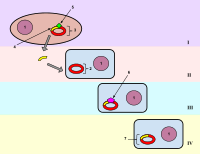
Photo from wikipedia
We developed a novel and convenient method for rapidly identifying CRISPR/Cas9-based genome-edited biallelic knockout (KO) cells/individuals carrying insertions or deletions of a few nucleotides (indels) by performing PCR on genomic… Click to show full abstract
We developed a novel and convenient method for rapidly identifying CRISPR/Cas9-based genome-edited biallelic knockout (KO) cells/individuals carrying insertions or deletions of a few nucleotides (indels) by performing PCR on genomic DNA samples under stringent conditions and low MgCl2 concentrations. The biallelic KO samples can be judged as ‘negative’ under these conditions. The sense primer corresponds to the sequence recognised by guide RNA and subsequently cleaved by Cas9 immediately upstream of a target gene’s proto-spacer adjacent motif (PAM), and the reverse primer corresponds to the sequence ~200 bp downstream from the PAM. PCR performed using this primer set under standard MgCl2 concentrations (1.5–2.5 mM) should generate PCR products derived from both mutated and unedited alleles, whereas PCR performed using lower MgCl2 concentrations (0.8–2 mM) should yield products derived from unedited alleles. This enables high-throughput screening of biallelic mutants among cells/embryos having ≥1 indels at a region within 5 bp upstream of the PAM (where more than 94% of indels are known to appear). We performed proof-of-principle analyses of this novel approach using genome-edited Et1, Tyr, Ramp1, Ramp3, and Rosa26 mouse samples carrying various types of indels, and demonstrate that this new technique allows rapid identification of biallelic KO mutants among samples carrying various types of indels and mosaic mutations with 100% accuracy. We name this system detection of biallelic KO mutants harbouring indels using PCR (Bindel-PCR).
Journal Title: Scientific Reports
Year Published: 2019
Link to full text (if available)
Share on Social Media: Sign Up to like & get
recommendations!